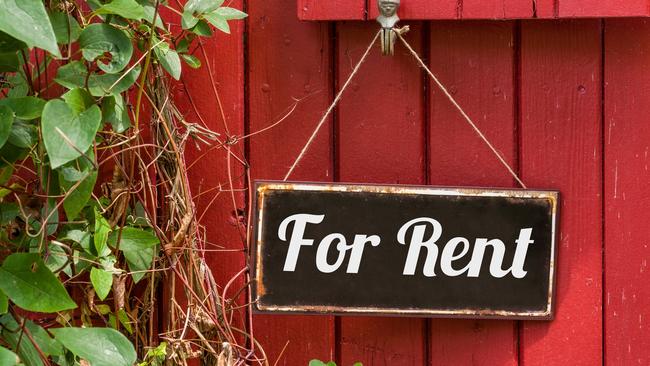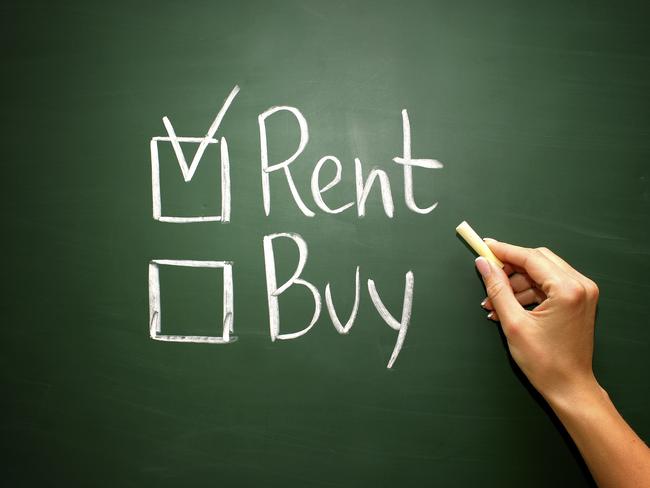Scott Pape: You’re not a loser if you rent
DESPITE what everyone around you might say, there are many intelligent reasons why you would choose to rent and save rather than borrow and buy, writes Barefoot Investor.

Barefoot Investor
Don't miss out on the headlines from Barefoot Investor. Followed categories will be added to My News.
I FROZE. Live on television.
The sweat welled up my back, and in my ears, making the voice coming from my plastic earpiece crackle.
“Scott ... What do you have to say to the caller?”
Thankfully this moment happened at the start of my career.
And thankfully it happened on Sky News (audience: seven Young Liberals) on a low-budget talkback show that consisted of the audience calling up and asking an expert money questions. (I was the expert.)
Unfortunately for me, the first caller happened to be a bitter former colleague, who decided he was suitably sloshed to call up the show and take me down a peg or two, live on TV:
“And why should anyone lisssen to yoo? You don’t even own ya own home. You’re a … RENTER!”

BAREFOOT: BUYING A HOME IS A MATTER FOR THE HEART RATHER THAN THE HEAD
For a good 20 seconds I sat in front of the camera saying nothing, swimming in my own insecurities.
Maybe he was right. I mean, what sort of financial expert was I if I didn’t even own my own home?
At the time my lack of homeownership gave me an inferiority complex.
I felt like I was locked out of the grown-ups club. Like I didn’t belong at the big people’s table at Christmas lunch: “Put on your silly paper hat and go and sit at the card table with the other kids.”
“But I’m 28!”
“But you’re still a renter!”
If you, dear reader, are a renter, you know the feeling.
And you probably wish it didn’t matter to you as much as it does.
That’s why I’m doing a shout-out to all the renters.
DON’T BECOME A POSTCODE POVVO
THERE’S a lot of pressure on young people to become postcode povvos.
That’s the name I give to people who hock themselves to the hilt so they can live in a fancy suburb … and end up living lives of quiet desperation.
In January, an extensive study of 26,000 Australian households by Digital Finance Analytics found that around 20 per cent of homeowners — one in five — are so stretched that they could lose their homes if interest rates rose by even 0.5 per cent. O.M.G.
So let’s put down the crack pipe for a moment. What the hell are these people thinking?
I’ll tell you what they’re thinking, because I have conversations with them all the time:
“My mother is so proud of me.” (Plus, she also gets to brag to her friends that you’re ‘sorted’).
“The bank lent me the money, and they wouldn’t have done it if I couldn’t pay it back … right?”
“House prices are going through the roof, so while things are tight now, it’ll surely pay off.”

Like a cranky old high school maths teacher, I’m continually amazed that most people make the biggest financial decision of their lives without actually doing the sums.
Don’t get me wrong — plenty of people spend hours working out ‘how much can I borrow, and what will that get me?’
Yet very few people calculate the total cost of homeownership (rates, maintenance, insurance, higher interest rates in the future) or think realistically about how long they plan to live in the home they buy.
Upgrading in less than 10 years is almost always a wealth-reducing exercise when you factor in stamp duty and agents’ fees.
YOU’RE NOT A LOSER IF YOU RENT
DESPITE what everyone around you might say, there are many intelligent reasons why you would choose to continue to rent and save, rather than borrow and buy.
Like that you haven’t found your prince (or princess) yet.
Or that you’re not sure where your career will take you. Or that you can’t afford it right now — that’s a bloody good reason.

Fifteen years of being the Barefoot Investor, together with the 19,000 questions I have sitting on my email database right now, has taught me this: very often it’s the case of the rich renter and the poor homeowner.
So chin up, renters. Pull those shoulders back. Delaying gratification is a sign of maturity.
If I could teleport myself back to that TV show, I would stare down the barrel of the camera and say:
“While I think everyone should eventually own their own home, I don’t think you should rush into it.
“I don’t own a home because I’m still saving up my deposit. It’s not easy. In fact, it’s a bloody hard slog. But it’s much better than being a broke homeowner or — worse — a postcode povvo.”
Tread Your Own Path!
BAREFOOT’S TOP 3
1. TOO OLD FOR SNAP
OUR 18-year-old babysitter tried to show me how to use Snapchat the other day, only to give up. “Don’t worry,” she said. “I don’t know any old people who use Snapchat anyway”.
My confusion extends to the Snap Inc’s share price. This week marked its first day of trading, with the shares soaring 40 per cent.
Investors are valuing the messaging app at $US28.3 billion ($37.4 billion) despite the fact it hasn’t made a profit and is blowing cash like a millennial with a credit card.

2. THE BOFFINS WHO CRIED WOLF
THE OECD issued (another) dire warning for Australian homeowners this week: “House prices and household debt have reached unprecedented highs.
“A continued rise of the market ... may end in a significant downward correction that spreads to the rest of the economy.” They’ve been saying this for years. It’s kind of like the boy who cried wolf — and that worked out OK, didn’t it?
3. YOU’VE GOT MAIL
WARREN Buffett released his annual shareholder letter on Sunday.
Besides detailing his investment returns — a handy 1,972,595 per cent since 1964 — the 86-year-old also gave a backhander to Wall Street money managers, suggesting they were rip-off merchants. And he proved it.
In 2007 Buffett made a million-dollar bet that a basic, no-brainer index tracker fund would outperform five hand-picked, elite hedge funds over 10 years. He was right: the hedge funds are up by an average of 22 per cent, the index fund is up 85 per cent
Barefoot Investor’s Ten Commandments, whittled down to three
Financial education too important to leave to banks
Following the Barefoot Steps puts victim on right path to financial security


